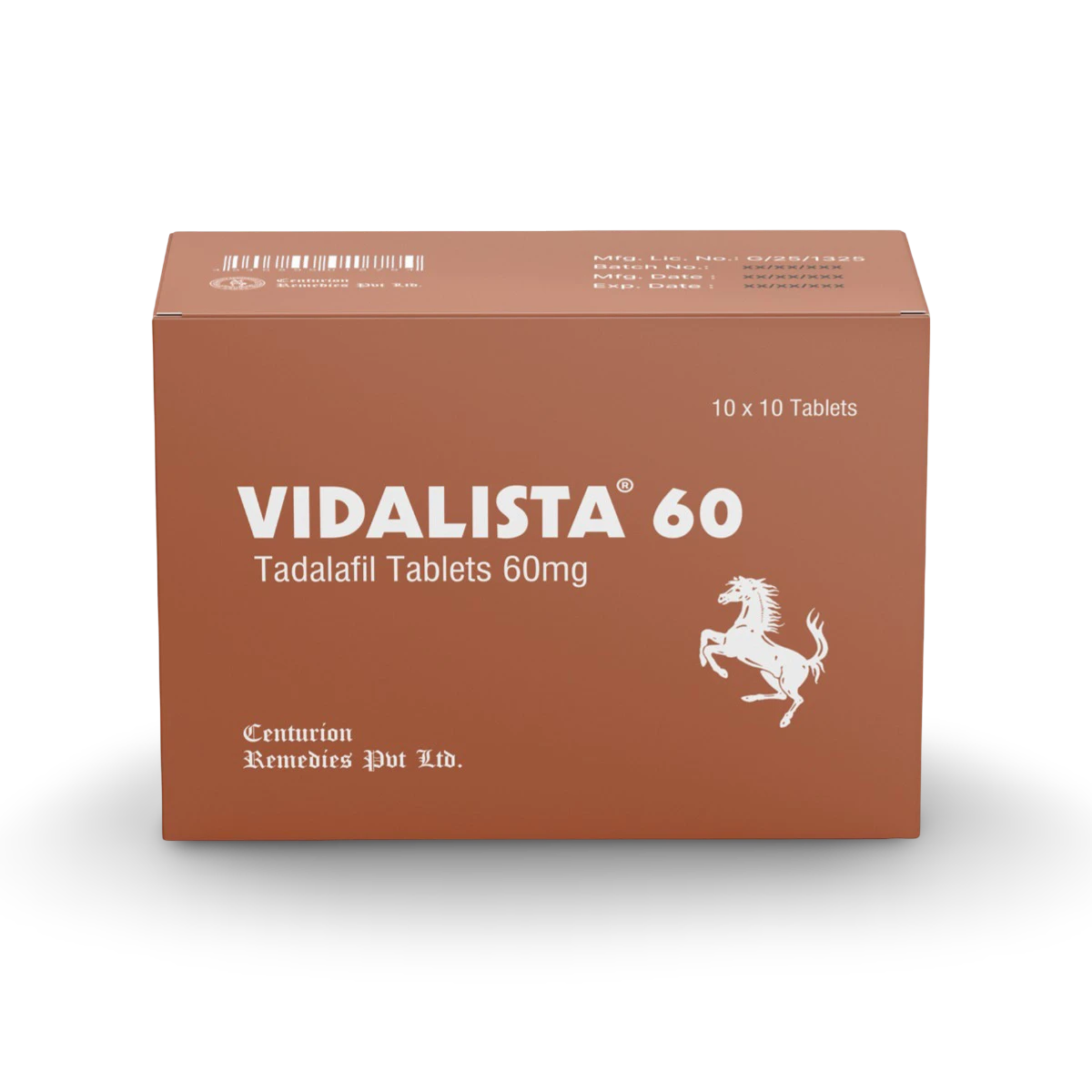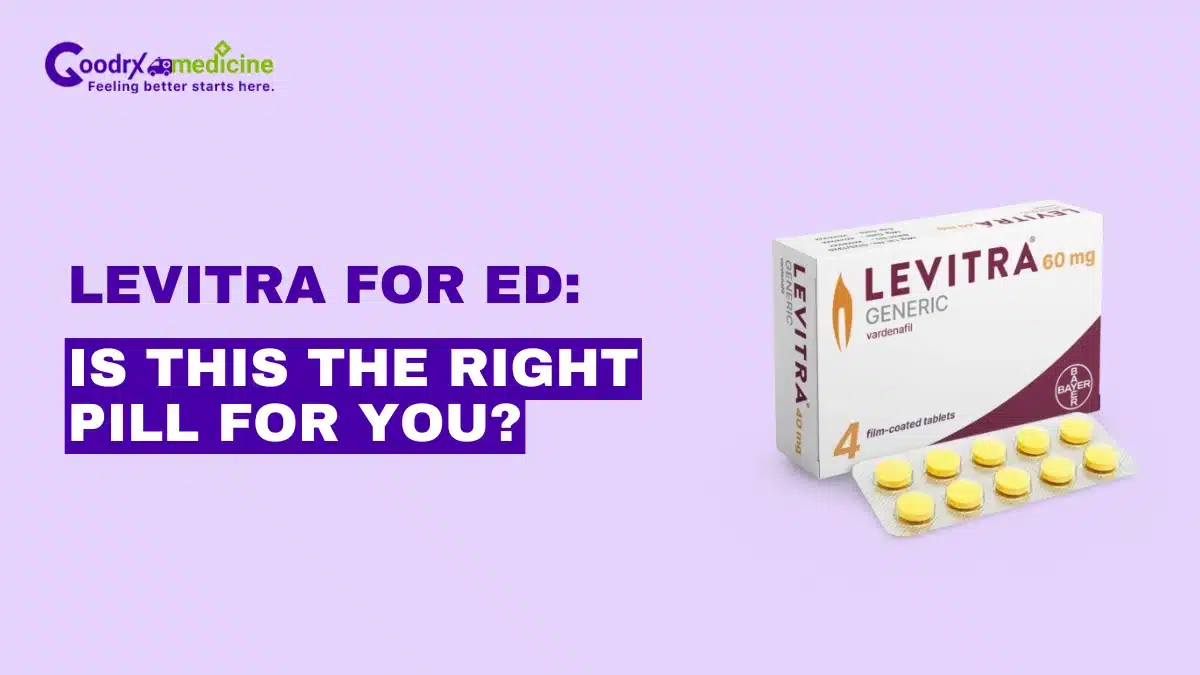Levitra is a prescription medication used to treat Erectile Dysfunction or ED in adult men. It contains Vardenafil, a clinically tested Phosphodiesterase type 5 or PDE5 inhibitor that helps improve blood flow to the penis during sexual stimulation.
Approved by the FDA, Levitra has demonstrated consistent efficacy and safety across various clinical trials. Its predictable onset of action and duration make it a suitable option for many men seeking ED treatment.
This article will cover how Levitra works, recommended dosages, possible side effects, and important precautions to consider before use to help ensure safe and informed usage, so read on.
What is Levitra?
Levitra is a prescription medication containing Vardenafil as its active ingredient. As a PDE5 inhibitor, it relaxes blood vessel muscles and elevates blood flow to the penile area.
Initially developed to treat Erectile Dysfunction, Vardenafil has gained widespread acceptance among healthcare providers since its introduction. It is validated by the Food and Drug Administration or FDA for this purpose. The tablet form is available in various strengths, which includes 5 mg, 10 mg, and 20 mg doses.
Levitra or Vardenafil does not cure Erectile Dysfunction permanently, nor does it increase sexual desire. The medication only helps men respond better to sexual arousal when it occurs naturally. Without sexual stimulation, the medication will not produce an erection.
Save up to 90% on your medicine bills

Cenforce 100 mg

Cenforce 200 mg

Kamagra Oral Jelly Rx 100 mg

Vidalista 60 mg
How does Levitra work?
Vardenafil blocks the action of PDE5, an enzyme that breaks down cyclic Guanosine Monophosphate or cGMP, a molecule that helps relax blood vessels. When PDE5 is inhibited, cGMP levels increase, leading to smooth muscle relaxation in blood vessels.
During sexual arousal, this process allows increased blood flow into the penis, helping achieve and maintain an erection. The medication enhances the body’s natural response to sexual stimulation but requires physical arousal to be effective.
The mechanism specifically targets the penis area, making it more responsive to sexual stimulation for up to several hours after taking the medication.
Recommended dosage and usage
Levitra dosage typically starts with 10 mg, taken about 60 minutes before planned sexual activity. Depending on how a patient responds and tolerates the medication, the dose may be adjusted.
- Initial dose: 10 mg taken orally
- Adjustment range: 5 mg to 20 mg based on response
- Elderly patients (65+): Start with 5 mg
- Maximum use: Once every 24 hours
- Onset of action: 30–60 minutes after ingestion
How to make Levitra more effective?
To make Vardenafil work more efficiently, consider the following:
- Take it on an empty stomach with a full glass of water and avoid heavy, fatty meals as it delays absorption.
- Limit alcohol consumption.
- Engage in sufficient sexual stimulation for optimal results.
- Maintain a healthy lifestyle, exercise, manage stress, and quit smoking if possible.
- Ensure consistent use as per the doctor’s advice if prescribed regularly.
These steps help improve circulation and enhance the body’s natural response to the medication.
Levitra side effects
Most users tolerate Vardenafil well, but side effects may still occur. They usually lessen with continued use or dose adjustments.
Common and mild side effects:
- Headache
- Facial flushing
- Nasal congestion
- Vision changes
- Upset stomach
- Dizziness
- Heartburn
- Flu-like symptoms
Serious side effects (seek immediate care):
- Chest pain or irregular heartbeat
- Difficulty breathing
- Severe dizziness
- Erection lasting more than 4 hours or Priapism
- Sudden vision or hearing loss
- Allergic reactions (hives, facial swelling)
Drug interactions
Vardenafil may interact with other medications, so it’s important to share your full medical history with your doctor before starting treatment.
Medications to avoid with Vardenafil:
- Nitrate medications (for chest pain)
- Riociguat (for Pulmonary Hypertension)
- Alpha-blockers (used for High Blood Pressure or the enlarged prostate)
- Some antibiotics and antifungals (e.g., Erythromycin, Ketoconazole)
- HIV medications (Ritonavir, Indinavir)
Who should avoid Levitra?
Not everyone is an ideal candidate for Vardenafil. Certain health conditions, medications, or age groups may make its use unsafe or less effective. Here’s who should avoid it:
- Liver or kidney impairment: Men with severe liver or kidney conditions may require adjusted doses or should avoid using the medication altogether.
- Eye disorders: Use caution if you have a history of vision problems or conditions like Retinitis Pigmentosa (a genetic eye disorder causing vision loss).
- Men with severe heart conditions: Those who have experienced a recent heart attack, stroke, or who suffer from uncontrolled blood pressure should avoid Vardenafil.
- Allergic reactions: Anyone allergic to Vardenafil or other PDE5 inhibitors should not take it.
- Prolonged erections: Those with a history of Priapism should avoid this medication.
- Women and children: Vardenafil is not approved for use in women or individuals under 18.
Conclusion
Levitra is a medically approved treatment for Erectile Dysfunction that enhances blood flow through its active ingredient, Vardenafil.
Vardenafil begins working within 30 to 60 minutes and may provide effects lasting as long as 4 hours. Available in 5 mg to 20 mg strengths, it should be taken once daily and ideally on an empty stomach.
Side effects like headache, flushing, or dizziness are common, while rare ones like prolonged erections or vision loss need urgent care. Patients must avoid drug interactions, especially with Nitrates or grapefruit.
With proper use and medical guidance, Levitra helps restore sexual confidence and improve overall quality of life.

Frequently Asked Questions
Is Levitra better than Viagra?
No, Levitra isn’t necessarily better than Viagra; it just works differently for some people. It may cause fewer side effects and be more effective in men with Diabetes. The best option depends on your health, body reaction, and doctor’s advice
Is it safe to take Levitra more than once a day?
No, it’s unsafe. Taking Vardenafil more than once in 24 hours increases the possibility or risk of serious side effects, like dizziness or heart issues. Always follow your doctor’s dosing instructions and never exceed the recommended frequency.
Is it safe to take Levitra with other ED medications?
No, combining Vardenafil with other Erectile Dysfunction medications like Viagra or Cialis is not recommended. It can increase the risk of side effects and may not improve results. Stick to one PDE5 inhibitor as advised by your doctor.
Can Levitra be used long-term without side effects?
Yes, Vardenafil can be used long-term if monitored by a healthcare provider. Regular checkups help ensure it remains effective and safe. Report any new symptoms to your doctor during ongoing treatment.
Is Vardenafil affected by stress or Anxiety levels?
Yes, psychological factors like Anxiety and stress can reduce Vardenafil’s effectiveness. Addressing these concerns through therapy, lifestyle changes, or stress management can enhance the medication’s results alongside proper medical use.
What’s the difference between regular and disintegrating Vardenafil tablets?
Disintegrating tablets (Staxyn) dissolve on the tongue without water and come in a fixed 10 mg dose. Generic Levitra or Vardenafil tablets can be adjusted to different strengths and are taken with water.
When referencing outside resources, GoodrxMedicine always provides full citations. To learn more about the measures we use to maintain the quality of our content, please review our Content Information Policy.











